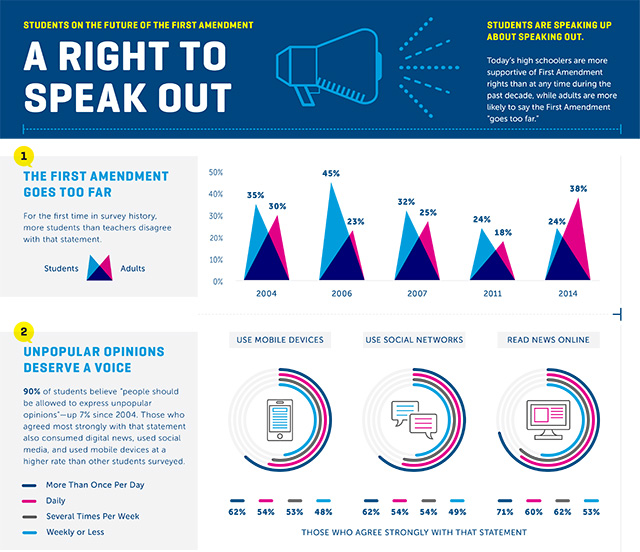MIAMI – Sept. 17, 2014 – Amid the national debates over press freedom, censorship, surveillance and privacy, a new survey shows students are more supportive of First Amendment than adults for the first time in a decade – and suggests increased digital news consumption and classroom teaching are driving the change.

Related Links
“News for high schools: Digital media plus teaching equals support for freedom” – by Eric Newton on Knight Blog
INFO GRAPHIC:
“A Right to Speak Out / Our Business is None of Yours”
SLIDESHARE:
Future of the First Amendment 2014 Survey
REPORT:
Future of the First Amendment 2014 Survey (PDF)
The national study of 10,463 high school students and 588 teachers was released today to coincide with the celebration of Constitution Day. It was funded by the John S. and James L. Knight Foundation.
“Student use of social, mobile and digital media to consume news is at all-time highs, and so is student support of the First Amendment,” said Eric Newton, senior adviser to the president of Knight Foundation. “The most supportive students of all are heavy digital media users who also have had a class explaining the First Amendment.”
The report, the fifth in a series of national surveys of high school students and teachers commissioned by Knight Foundation over the last 10 years, holds important implications for the future of the First Amendment. Courts interpret the meaning of the first amendment within the context of public opinion.
Key study findings include:
● High school students are showing more appreciation for the First Amendment than adults. Only 24 percent of students said that the First Amendment goes too far in guaranteeing the rights of religion, speech, press assembly and petition. In comparison, a Newseum Institute survey that tracks adult opinions on the first amendment showed that 38 percent of adults feel this way. This marks a shift: 10 years ago students (35 percent) were more likely than adults (30 percent) to say that the First Amendment goes too far.
● More students than ever before are showing support for the First Amendment: Nine in 10 students surveyed said that “people should be able to express unpopular opinions,” and 60 percent oppose government surveillance of online information and phone calls even to identify terrorists.
● Both digital news consumption and First Amendment appreciation are growing among high school students. Seventy-one percent of students said they read news online daily; in 2006 only 31 percent said they got news and information from the Internet several times per week. And while only eight percent of students reported consuming news and information daily through mobile devices in 2007, the latest report shows 62 percent of students now use mobile for this purpose—the highest level measured by the survey.
● Digital media works hand-in-hand with the classroom. First Amendment support is highest among students who had a class that dealt with the First Amendment and used digital media on a regular basis. For example, 65 percent of the students who use digital news daily agreed strongly that people should be able to express unpopular opinions, but if they had a First Amendment-related class, the strong support for free speech rose to 69 percent.
● Most teachers do not support free expression for students creating content about their schools. In a generational divide, the majority of teachers disagree that First Amendment rights should apply to school activities. For example, 57 percent of teachers feel that students should not be allowed to report on controversial issues in student newspapers and 67 percent say that students should not be allowed to express their opinions about teachers and school administrators on Facebook without penalty.
On Sept. 21 at 2 p.m. ET a panel discussion will be streamed (www.newseum.org/streaming) from the Newseum to explore key findings from the report. In February 2015, Knight Foundation will be teaming up with the 1 for All campaign for a new “Free to Tweet” competition, encouraging students nationwide to use social media to celebrate the First Amendment; participants will be eligible to win scholarship funds. The 1 for All campaign, coordinated by the American Society of News Editors and the John Seigenthaler Chair for Excellence in First Amendment Studies at Middle Tennessee State University, strives to build awareness of First Amendment freedoms through education and outreach.
“This important study reminds us of the need to pro-actively teach what young people engaged in social media know intuitively: First Amendment freedoms are at the heart of the American experience and collectively make our democracy possible,” said Ken Paulson, president of the Newseum Institute’s First Amendment Center and dean of the College of Mass Communication at Middle Tennessee State University.
For more information about activities celebrating the First Amendment, follow Knight Foundation and the First Amendment Center on Twitter.
For more on the Future of the First Amendment Survey, visit www.knightfoundation.org/1stamendment
About the John S. and James L. Knight Foundation
The John S. and James L. Knight Foundation supports transformational ideas that promote quality journalism, advance media innovation, engage communities and foster the arts. The foundation believes that democracy thrives when people and communities are informed and engaged. For more, visit www.KnightFoundation.org.
###
CONTACTS:
Anusha Alikhan, Director of Communications, John S. and James L. Knight Foundation, 305-908-2677, [email protected]
